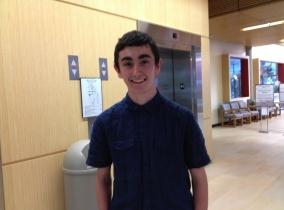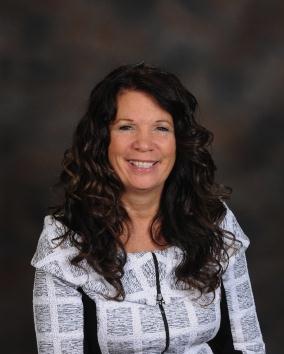
Grade 9 student Anthony Hope says he was "really impressed" Larsen shared her personal story. "It was inspiring to know that there are people on the board that have experience and there are other people who have connections to this." Credit: Natasha Barsotti
Calling it a step in the right direction, teachers, students and community groups are cautiously optimistic about the Surrey school board’s unanimous decision to strike a working group to review anti-discrimination policy, with specific focus on homophobia.
School trustee Laurie Larsen spearheaded the motion, following comprehensive presentations by the district’s teachers’ association and Surrey students about the pervasive homophobia in schools and the need for anti-homophobia policy.
Larsen revealed a gay cousin’s experience with homophobia that ended in his murder when he was 19. She said a short video by one of the student presenters, Anthony Hope, featuring a youth’s fictional suicide, reminded her of her cousin’s struggles. “It’s not just suicide; it’s the hate that people have and don’t understand,” Larsen later told Xtra.
She said she appreciated how hard it was for students to speak before the board and “to be vocal.”
In calling for a stand-alone anti-homophobia policy, the delegations asked that it specifically include leadership from school administrators, professional development for staff, curricular integration of queer issues, support for gay-straight alliances (GSAs), training for counsellors and education for parents.
In their presentation, the Surrey Teachers’ Association (STA) called on the school board to create an advisory committee to draft discrete policy to be passed in the 2012/13 school year, allowing for community consultation.
“We do not support minor revisions to the existing anti-harassment policies,” the STA said.
Trustee Charlene Dobie’s motion to remove the anti-discrimination policy from a board vote on a package of newly revised district policies failed. The revised anti-discrimination policy now includes minor language changes, with references to homophobia as a form of discrimination that will not be tolerated.
Asked why the board changed the language in the anti-discrimination policy ahead of the delegations’ presentations, school board chair Laurae McNally says the board didn’t know what the presentations were going to contain. “They said they wanted to speak about the issue, but we didn’t have copies of their presentation ahead of time to look at it.”
“I thought they made some very good points,” McNally acknowledges. “They clearly have outlined some areas where they have concerns, and that gives us a starting point.
“Our goal, quite frankly, is not to create the most perfect policy in the world. Our goal, as a board, is to establish and support a better environment,” she continues. “I think the subsequent motion that Laurie Larsen made gives us a good groundwork to do that.”
Asked if she is supportive of having stand-alone anti-homophobia policy, McNally says her goal is to have the district support the inclusion of all marginalized students, whether it’s through stand-alone or whether it’s rolled into a policy.
“I think you can effect the same outcome even through regulations. But clearly, there’s work to be done, and I’m really happy that the working committee will get together.”
McNally says she hopes the group will look into the inclusion of queer issues in the curriculum, as well as training for staff and teachers. “I would like to see students and counsellors on the committee,” she adds. “I’d be really interested to see their recommendations.”
McNally doesn’t anticipate opposition. “I think society is changing, quite frankly.” She says Surrey’s infamous book-banning fight is all in the past.
Hope, a Grade 9 Johnston Heights student, says he was “really impressed” that Larsen shared her personal story. “It was inspiring to know that there are people on the board that have experience and there are other people who have connections to this,” he says.
Hope thinks the working group is a good start but says he still needs some clarification about how it would work. “I’m hoping it will include students, parents, the public so that they can have as unbiased as possible a view.”
Laura Barker, STA second vice-president, says she’s pleased about the idea of a working group. “I think that shows great progress and shows they’re going to take the presentation seriously,” she says. “We didn’t really expect them to pass a policy tonight.”
Grade 10 student Adam Kopczynski found the trustees supportive but was disappointed they didn’t immediately pass a policy. He says he understands that “you can’t really rush into things like that” but feels the board passed the buck to the superintendent.
Fraser Heights teacher Julia MacRae says the presentations were strong and the trustees were listening.
“I don’t think they’ll have such an easy time sweeping it under the rug, but I don’t know. I don’t have a lot of confidence in their progressive natures,” MacRae adds.
She says she’s interested in the working group’s eventual makeup. “Is it just principals, or are students involved, the people involved in GSAs, teachers, community members?” she asks. “Ideally, there’d be a range of people involved in that.”
At the end of the day, she says, it will be helpful to have specific policy. “I want to know I’m going to be backed up by employers to do this work that’s really important.”
Asked if she anticipates opposition to specific policy, Larsen says people have advanced in the 10 years since the book-banning episode but concedes there are still people who need to be educated.
“But maybe it’s a different time now,” she adds.
“Surrey has its mix of liberal and conservative residents. From what I’ve personally experienced, the younger generation is, I find, generally more accepting,” Hope says. “The older generation is more insistent on reducing rights of certain areas of the public, especially with the city’s history, the book banning that happened a while ago.
“All I think we can do is hope that things will change, and we have to create that change.”


 Why you can trust Xtra
Why you can trust Xtra


